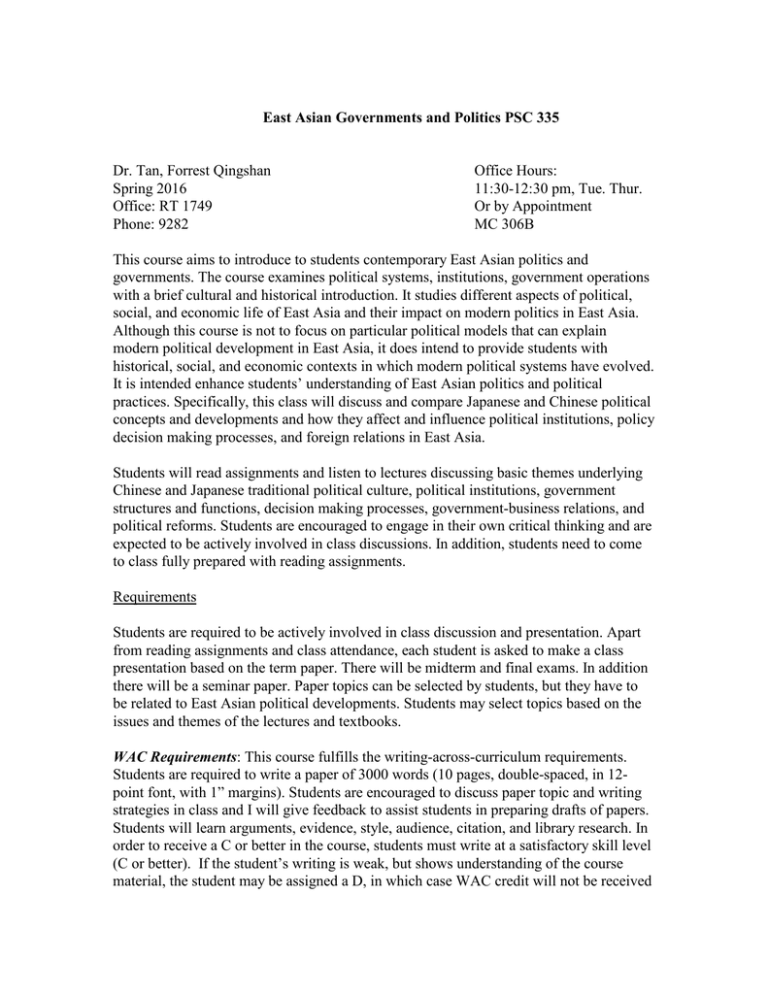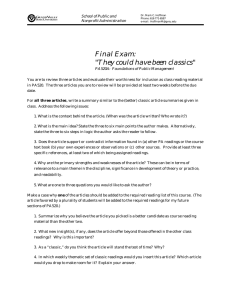East Asian Governments and Politics PSC 335 Dr. Tan, Forrest Qingshan
advertisement

East Asian Governments and Politics PSC 335 Dr. Tan, Forrest Qingshan Spring 2016 Office: RT 1749 Phone: 9282 Office Hours: 11:30-12:30 pm, Tue. Thur. Or by Appointment MC 306B This course aims to introduce to students contemporary East Asian politics and governments. The course examines political systems, institutions, government operations with a brief cultural and historical introduction. It studies different aspects of political, social, and economic life of East Asia and their impact on modern politics in East Asia. Although this course is not to focus on particular political models that can explain modern political development in East Asia, it does intend to provide students with historical, social, and economic contexts in which modern political systems have evolved. It is intended enhance students’ understanding of East Asian politics and political practices. Specifically, this class will discuss and compare Japanese and Chinese political concepts and developments and how they affect and influence political institutions, policy decision making processes, and foreign relations in East Asia. Students will read assignments and listen to lectures discussing basic themes underlying Chinese and Japanese traditional political culture, political institutions, government structures and functions, decision making processes, government-business relations, and political reforms. Students are encouraged to engage in their own critical thinking and are expected to be actively involved in class discussions. In addition, students need to come to class fully prepared with reading assignments. Requirements Students are required to be actively involved in class discussion and presentation. Apart from reading assignments and class attendance, each student is asked to make a class presentation based on the term paper. There will be midterm and final exams. In addition there will be a seminar paper. Paper topics can be selected by students, but they have to be related to East Asian political developments. Students may select topics based on the issues and themes of the lectures and textbooks. WAC Requirements: This course fulfills the writing-across-curriculum requirements. Students are required to write a paper of 3000 words (10 pages, double-spaced, in 12point font, with 1” margins). Students are encouraged to discuss paper topic and writing strategies in class and I will give feedback to assist students in preparing drafts of papers. Students will learn arguments, evidence, style, audience, citation, and library research. In order to receive a C or better in the course, students must write at a satisfactory skill level (C or better). If the student’s writing is weak, but shows understanding of the course material, the student may be assigned a D, in which case WAC credit will not be received for the course. Maximum enrollment for this course is 35 or 45 with a graduate assistant. The assigned writing is in English unless the course is specifically geared to improving writing at the 300-level in another language. The term paper is due on last day of class. The following formula will be used to determine the final grade: *Class participation: Mid-term: Final exam Term paper 15 percent 25 percent 30 percent 30 percent * This is defined as class attendance, discussion, and presentation. There will be two textbooks that constitute the basic readings for this course. Other reading materials will be given as the course goes on; some will be put on reserve. The following textbooks will be available for purchase at the campus bookstore: Tony Saich, Governance and Politics of China, 3rd Edition (Palgrave, 2011). Louis D. Hayes, Introduction to Japanese Politics, 5th Edition (M.E. Sharpe, 2009). Course outline and readings: Week One: Introduction: A Geographic China Readings: Saich, Chapter 1, and 2. Cultural and Historical Overview The Imperial System Confucianism Readings: Wang: Chapter 1 on reserve, lecture Week Two: The Making of A New Republic and the Communist Party The Opium War and the decline of China The Chinese Nationalist Movement The Rise of Communism Readings: Wang: Chapter 2 on reserve. Week Three: Mao’s China, Economic Reform and the Open Door Policy The Land Reform, The Great Leap Forward The Cultural Revolution Readings: Saich: Chapter 3 Decommunization 1978 economic reform The Rise of China Chinese integration into the world Readings: Saich, Chapter 4, 11. Week Four: The Chinese Communist Party and Government Party Organization The role of the CCP Readings: Saich: Chapter 5 The Central Governing apparatus The local government Readings: Saich: Chapter 6, 7. Week Five: State and Society Political participation State and society relations Social policy Readings: Saich: Chapter 8, 9, 11. Week Six: Chinese nationalism and Foreign policy Media and Internet Foreign policy Responsible power Readings: Saich, Chapter 12, Week Seven: Rise of China and Implications Background of China Rise Fragile power and domestic issues Readings: China Rising in Historical Perspective, Part I, and II, By Dr. G. Wright Doyle, http://www.globalchinacenter.org/analysis/chinese-history-culture/china-rising-inhistorical-perspective-part-i.php Charles Glaser, Will China's Rise Lead to War? Why Realism Does Not Mean Pessimism, Foreign Affairs, March/April 2011. Amitai Etzioni, The End of China's Rise, The National Interest, July 25, 2012, http://nationalinterest.org/commentary/the-end-chinas-rise-7220?page=show Robert Fogel, Why China’s Economy Will Grow to $123 trillion by 2040, Foreign Policy, January 2010. Week Eight: China’s Foreign relations Japan The Taiwan issue The United States Mid-term exam Week Nine: Spring Recess Week Ten: Japan: An Introduction The Meiji Restoration Modernization The Failure of Militarism Readings: Hayes, Chapter 1, 2. Week Eleven: Political System and Party Politics The Structure of government Political Parties Readings: Hayes, Chapter 3, 4, 5. Week Twelve: Political Corruption and the Politics of Electoral Reform Readings: Hayes, Chapter 6, 7. Week Thirteen: Japanese Social and Economic Development The Social Order Economic miracle and debacle Readings: Hayes, Chapter 8, 9. Week Fourteen: The Public Sectors Education system The Criminal Justice System Readings: Hayes, Chapter 10, 11. Week Fifteen : Japanese Foreign Policy Peace Constitution Defense Policy Foreign Relations Readings: Hayes, Chapter 12, and 13. Class conclusion Class Review Paper presentation.







